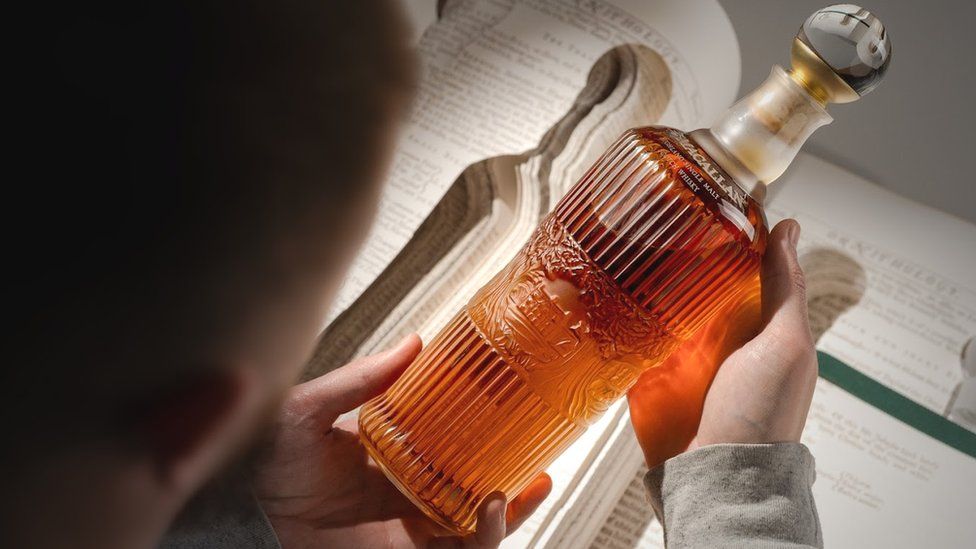It is called the ‘Water of Life’ for a reason, right? And with the amount of other, cheaper options available, it will have to do something special to be worth the extra price and the prestige it brings. Whisky drinkers are looked at as a lot more sophisticated and distinguished than those who drink beer or any alcoholic beverage such as tequila or other flavored offerings.
But you wouldn’t find beer at that high price either, making it a different beverage that has less to do with refreshment than it has with class. After all, you won’t find beer at some grand whisky auction where a single bottle can cost thousands of dollars–something the average person won’t be too happy to let go of.
So, what makes this so special and so different from the rest? Well, let’s get into it.
A Barrel of Differences
Whisky is often considered special and distinct from other alcoholic beverages, and for good reason. Regular alcoholic beverages are typically easy to make and can be produced more efficiently than scotch and whisky.
There are, of course, much more affordable options for whisky available, but that’s not the point. It is a fundamentally different beverage to the point that it should not be called a ‘beverage’ at all. After all, something you buy at a whisky auction online isn’t really meant to be consumed in an evening. At the very least, it has to be a classy affair when whisky is offered as an option. It is not something to be downed in one gulp.
Aging and the Process
Speaking of, one of the fundamental reasons for its distinguished status is the aging process. Whisky is typically aged in wooden barrels for several years, which allows it to develop complex flavors and aromas. The aging process imparts unique characteristics to the spirit, such as notes of vanilla, caramel, and spices, which can be highly appealing to many consumers who prefer variety.
Variety and Diversity
That being said, whisky also comes in a wide range of styles, including Scotch, bourbon, rye, and much more. Each style has its own unique production methods, ingredients, and regional influences, resulting in a diverse selection of flavors and profiles. This variety allows whisky enthusiasts to explore and appreciate different styles and expressions. Some prefer the American bourbon, while others may prefer the Scotch, a Scottish classic.
Craftsmanship
Whisky production involves a meticulous and labor-intensive process that requires skill and expertise. Distillers carefully select grains, water, and yeast, and they monitor the fermentation and distillation processes to create a high-quality product. Aficionados of the drink highly regard this craftsmanship and attention to detail, but that also makes it difficult to manufacture compared to other beverages.
Tradition and History
Many whisky brands have long and storied histories, often spanning centuries. This tradition and heritage add a sense of authenticity and romance to the whisky-making process, which can enhance the perceived value of the product. Many who seek luxury brands and other amenities often prefer products that have storied histories they can share with friends and equally classy company.
This history increases more than just the monetary value, but also adds sentimental significance. Some whisky bottles, especially rare and limited-edition releases, can become highly sought after by collectors and investors. The scarcity of certain whisky bottles and their potential for appreciation in value makes them particularly appealing to enthusiasts.
Some collectors, though, prefer the sentimental value and simply keep collections because they love doing so and don’t often consider the monetary value. Of course, anything worth collecting needs to have some monetary value attached to it, so collectible bottles can often be expensive as well.
Cultural Significance
Whisky has been associated with various cultural traditions and rituals, such as toasts, whisky tastings, and specific ways of enjoying the spirit. These customs contribute to the allure of whisky and create a sense of community among those who appreciate it.
These classes of drinks are often found at functions, fundraisers, weddings, and other events where formal wear is or at least might be common. Of course, that isn’t the only place it’s found, and it also depends on the type of whisky, too. This is a drink that can be enjoyed in various ways, whether neat, on the rocks, in cocktails, or paired with specific foods. This versatility allows anyone to tailor their whisky-drinking experience to their preferences and occasions.
Someone with a sophisticated palette and taste will prefer a more flavored whisky, while most Americans prefer Bourbon or Irish drinks and for them to be as simple as they can be.
Flavor Complexity
Speaking of flavors, whisky often features a rich and complex flavor profile, which can include a combination of sweet, bitter, smoky, and spicy notes. This complexity makes it a popular choice for those looking to savor and explore different flavors in their drink.
Even whisky on the rocks, which means adding ice to it, can dampen the raw taste and be more manageable, so the flavor sensitivity can make it an excellent base for adding flavors.
An Expensive Taste
The average price of a whisky bottle can vary significantly depending on various factors such as the brand, age, type of whisky, and country of origin. Whisky prices can range from relatively affordable to extremely expensive.
American, Irish, and Scottish Whisky
For example, you could find some standard blended bottles in the more affordable ranges. A 750ml bottle could be around $40, while a single malt scotch can start at around $40 and go up to $50, $100, and further up in price until it is in the thousands. That usually depends on the rarity of the bottle, though.
Bourbon whisky prices also vary, but you can find decent bottles in the $20 to $40 range, with premium and aged options costing more. Most of the 40-ish dollar whisky bottles are typical of brands that offer less premium options but are still worthwhile. Stag whisky, for example, can be as low as $20 and go up to $80 in some selections, though much more expensive options are certainly there.
Japanese Whisky
You will often find whisky to be from the Big Three, which is America, Scotland, and Ireland, though there is another competitor that is less recognized but is bringing in quality options, and that is Japanese whisky. It has gained popularity in recent years, though not as much to be mainstream just yet. Most basic options here are similar at $40 to $50 dollars, though premium options can easily cost hundreds more.
Premium Collector’s Items
Collectible and rare whiskies can cost several thousand dollars or more, and some limited-edition or highly sought-after bottles can command significantly higher prices at auctions. Most whisky is sold through auctions, whether it is for fundraising or to seek out the highest bidder. It is here that the most expensive bottles are sought, bought, and sold.
You will often find bottles in the thousands of dollars being sold at these auctions. Some could even be Stag whisky selections that are rarer or the kind that take a long while to manufacture. Those options bring their high prices through the prestige of the brand as a bonus rather than the fundamental reason for the premium price tag.
All in all, what makes whisky special is a matter of personal preference. While many people appreciate its unique qualities and history, others may have different preferences and find other alcoholic beverages equally special in their own ways.





